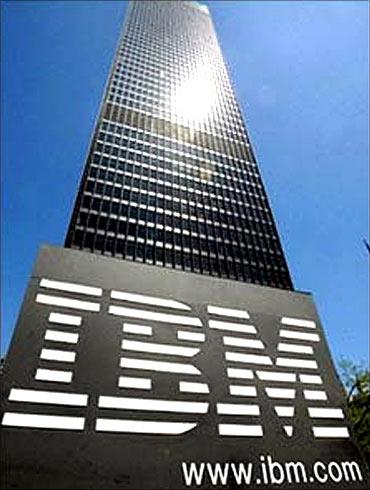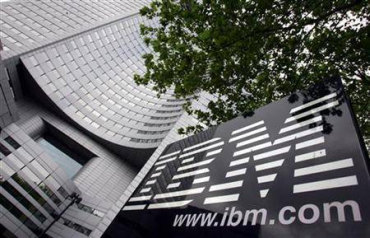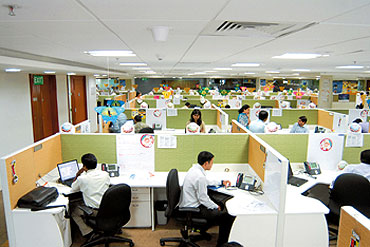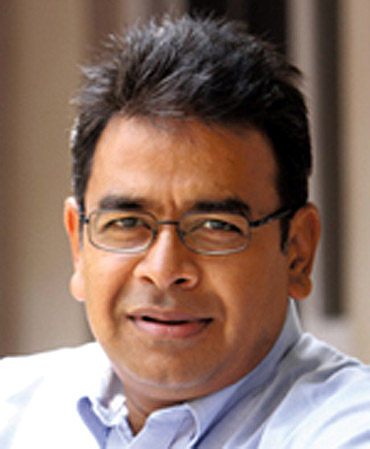 | « Back to article | Print this article |
All you need to know to get a job at IBM
Who are the people behind India's optimistic yearning to overcome energy inefficiencies in existing grid and move toward more sustainable energy networks through smart grids?
If for the first time, organisations across the globe are able to integrate and analyse tens-of-petabytes (1000 terabytes or 1015) of data in its native format and gain critical intelligence in sub-second response times, who should be given credit?
And if using cloud computing data thus collected on weather, demographics and household characteristics, one is able to provide the citizens and city officials an integrated view of water consumption, conservation, increased leak reporting rate that ultimately encourage a behaviour change, who is to be acknowledged?
Well, the common thread that weaves them all is International Business Machines. IBM is a truly diverse company not only known for its technology but increasingly playing a leading role in consultancy. With operations in 170 nations across 20 industries, IBM employs 400,000 people globally.
Click NEXT to continue
IBM has been at the forefront of innovations
The origin of IBM
It was on June 16, 1911 that Computing-Tabulating-Recording Company (CTR) was formed as a result of a merger of three companies: the Tabulating Machine Company, the International Time Recording Company and the Computing Scale Company of America. Thomas J. Watson Senior, who joined CTR in 1914, over a period of time, transformed it into a growing leader of innovation and technology.
In 1924, the company's name changed to International Business Machines Corporation (IBM). A year before CTR introduced the first electric key punch, setting its tabulating equipment apart from its competitors' mechanically driven systems and five years hence, IBM introduced the revolutionary 80-column punch card design called the "IBM Card", which became an industry standard.
Historically, IBM has been at the forefront of technological advancement and business innovations.
The accounting machine in 1934, the first commercially successful electric typewriter in 1935, vacuum tube multipliers in 1943 that substituted the vacuum tubes for electric relays, the Selective Sequence Electronic Calculator in 1949; FORTRAN (FORmula TRANslation) scientific programming language in 1957; introducing SABRE reservation system for American Airlines in 1962 being the first system to work over phone lines in "real time," linking high-speed computers and data communications to handle seat inventory and passenger records; speech recognition techniques in 1969; relational database in 1970; floppy-disk magnetic storage in 1971; Reduced Instruction Set Computer (RISC) architecture in 1980; a ThinkPad in 1992 and a Thinkpad TransNote in 2001 that combines a mobile computer with a digital notepad are all noteworthy achievements of IBM.
Though IBM established a hardware manufacturing unit in India way back in 1951, the operations began only after it re-entered Indian soil in 1992. IBM India's solutions and services span all major industries including financial services, healthcare, government, automotive, telecommunications and education, among others.
The distinguishing characteristic of the company is the sheer diversity of portfolio it has which includes research, consulting, solutions, services, systems and software. IBM has been expanding its footprint in India and currently has a presence in over 200 cities and towns across the country.
Click NEXT to continue
Domain-wise career opportunities
Global Business Services
The people working here help in transforming businesses by bringing fresh thinking and valued business insight, juxtaposed with the world's most advanced technology.
Thus as an individual in the team, one gets involved in strategic evaluation, business model design, process transformation, application development and implementation. Being part of one of the world's largest consulting organisations, all elements of a successful consulting career and successful services organisation intersect.
Consulting
One can build a career in one or more of these areas, focusing deeply on a particular discipline or developing expertise across several. The functional areas are:
- Application services
- Business intelligence
- Customer relationship management
- Enterprise Resource Planning
- Financial management
- Human Capital Management
- Strategy and Change
- Supply chain Management
Integrated Technology Delivery
This domain delivers standardised solutions that are more automated, repeatable and globally integrated. People working here make use of IBM's global presence to ensure that the clients get the latest technological solutions, gain cost advantages and get access to industry-leading skills.
Global Technology Services
This is a service division that helps clients integrate information technology with business value. Personnel work to deliver integrated and flexible IT infrastructure services such that the clients are able to save money and be more competitive.
Systems & Technology Group
One of the most alert and aware domain, the STG is always updated on the latest technological innovations. It delivers value to clients with its expertise across the IT Infrastructure comprising IBM's servers, storage, engineering services, and semiconductor solutions. STG is often referred to as the "hardware" division of IBM. STG's business units include System x, Power Systems, System z, Storage and Retail Store Solutions.
Software Group
This division has a dynamic portfolio of open, scalable, secure and industry-focused products and solutions. Currently, the product portfolio includes Lotus, Websphere, Rational, Tivoli and Cognos.
IBM Global Financing
This domain started its India operations in 2000 and continues to provide flexible and appropriate financing and leasing options. It helps customers through greater access to the hardware, software, solutions and services that are essential to compete in the global marketplace. Personnel need to be equipped in functions such as leasing and lending, asset management and international financing.
IBM Daksh
Being a part of IBM's Managed Business Process Services business, this division leverages IBM's globally integrated enterprise model to deliver solutions in the field of CRM, F&A, Knowledge and Technical Services, HRM, and SCM across industries, including utilities, financial services, travel, telecom, and online services.
Network Solutions
Known popularly as Netsol, this domain banks on service delivery model to offer scalable and flexible solutions. It helps clients differentiate and innovate today, for tomorrow. Broadly classified, Netsol's services include IT Managed Services and Network Services.
IBM India Software Lab
The IBM India Software Lab is one of the largest product and technology development labs for IBM worldwide. The Lab is responsible for building products, developing technology and solutions for IBM's Software Divisions. The Lab also provides industry expertise, practical tools and powerful development capabilities.
IBM Research India
Co-located in New Delhi and Bangalore, the lab is focused on a wide array of research areas blending pure and applied research. It offers advanced state-of-the-art breakthroughs in IT through research in software and services. The division supposedly has the brightest minds working on solutions for the future.
There are career opportunities in other areas such as Hardware and Software sales, globally integrated support functions and so on.
Click NEXT to continue
People-wise career opportunities
Experience
At a mature level, one can reinvent oneself offering his/her services in a domain which is new.
So at IBM, you could be a Biologist by training and still work as an engineer or you could be an expert in the functional area of accounting and finance and still be contributing to the consulting services. In other words, age does not decide your learning capability. If one is keen to learn new skills, work across different disciplines or move into new challenges, it is all possible.
Freshers, University Students
It is possible to make an impact early in your career. You may explore the opportunity of being part of innovative approaches in varied technology areas: this could be predicting climate change, optimising energy production, or modernising healthcare systems. If we talk at a broader level, this could be in hands-on consulting, research, value-driven services, super-computing or software collaboration.
As per IBM website, "You can be part of a company that has a real impact on making the world work smarter. Whether you're an undergraduate or post-graduate, we'll help you turn your years of study into tangible achievements through a vast array of career opportunities and development programs". I recall a candidate's response as he waited for his placement interview: "Who would not be proud to work at IBM, if one has to build a smarter planet?"
Click NEXT to continue'We believe in paying the best like the best'
How many people work in IBM? How many in IBM India?
IBM employs about 400,000 people globally. As a 'Globally Integrated Enterprise', IBM does not discuss country specific headcounts.
How does IBM plan their recruitment in India?
Recruitment plans are based on an assessment of internal requirements and the availability of talent.
Why do you think IBM is an inspiring firm to work for both students and experienced people?
IBM's position as an employer is unique in the sense that few places offer as many opportunities as IBM to gain knowledge in a preferred field of expertise, work in a stimulating environment, and be rewarded for outstanding performance. From research to consulting, services, solutions and products -- the breadth and global spread of our business offers career opportunities that straddle all facets of a global business.
Which are the areas of future recruitment? What qualifications or attributes are required for such positions?
The following areas offer immense potential for some exciting job opportunities.
- Growth markets: Emerging markets are building out their infrastructure, and we are organizing our resources to pursue this opportunity aggressively.
- Cloud and smarter computing: Cloud offers new ways of managing, consuming and delivering IT-based services. And the business model that's emerging is to build the next-generation data centre and deliver clouds on the basis of specific workloads.
- Business analytics and optimisation: Analytics are the key to unlocking insight. And IBM has moved quickly to take advantage and capitalise on this promise. Industrialised recruitment, flexible employment models, a globally mobile and agile workforce, great leadership development, clear roadmaps, these are all attributes that are required for fulfilling such positions.
How many universities/academic institutes did you visit during 2010-11 and what was the intake?
IBM visited campuses of over 150 academic institutes in 2010/11 and hired over 3200.
In which areas were the maximum number of recruitments made?
IBM's 'Global Delivery Centres for Business Services' and 'Technology Services' absorbed the most.
What can an employee expect after spending 2-3 years in IBM India, in terms of average salary increase?
IBM's compensation strategy is based on 3 pillars:
- Pay Competitively: IBM understands that markets for jobs drive pay rates. It also strives to maintain competitive pay levels over time
- Pay for Performance: Rewards based on business and individual performance. Investments are focused on paying the "best like the best."
- Differentiate strongly: Results/outcomes drive differences.
However, with the varied business units and skill sets of employees, commenting on the salary increases is not feasible.
Click NEXT to continueAdvantages of working at IBM
- Performance-based bonuses for all the employees
- An empowering work environment with impressive infrastructure
- Community service and volunteer work
- Advancement of women as it focuses a lot on mentoring and coaching for women
- Cultural awareness and acceptance through embracing cultural differences
- Mobile working that enhances employee effectiveness at different locations, be it airport, mobility workstations or home.
- Healthcare and retirement benefits that include medical, wellness, insurance etc.
- Performance-based global recognition programme that rewards individuals.
- Career/skills development programmes
- Range of career options that allow moving to different jobs & career paths within IBM including international careers.
IBM's e-workplace offers an attractive mix of flexible work programmes, allowing time for family and hobbies. IBM also offers performance-based global recognition programmes final population totals is likely to be released in a year, after the scanning.





